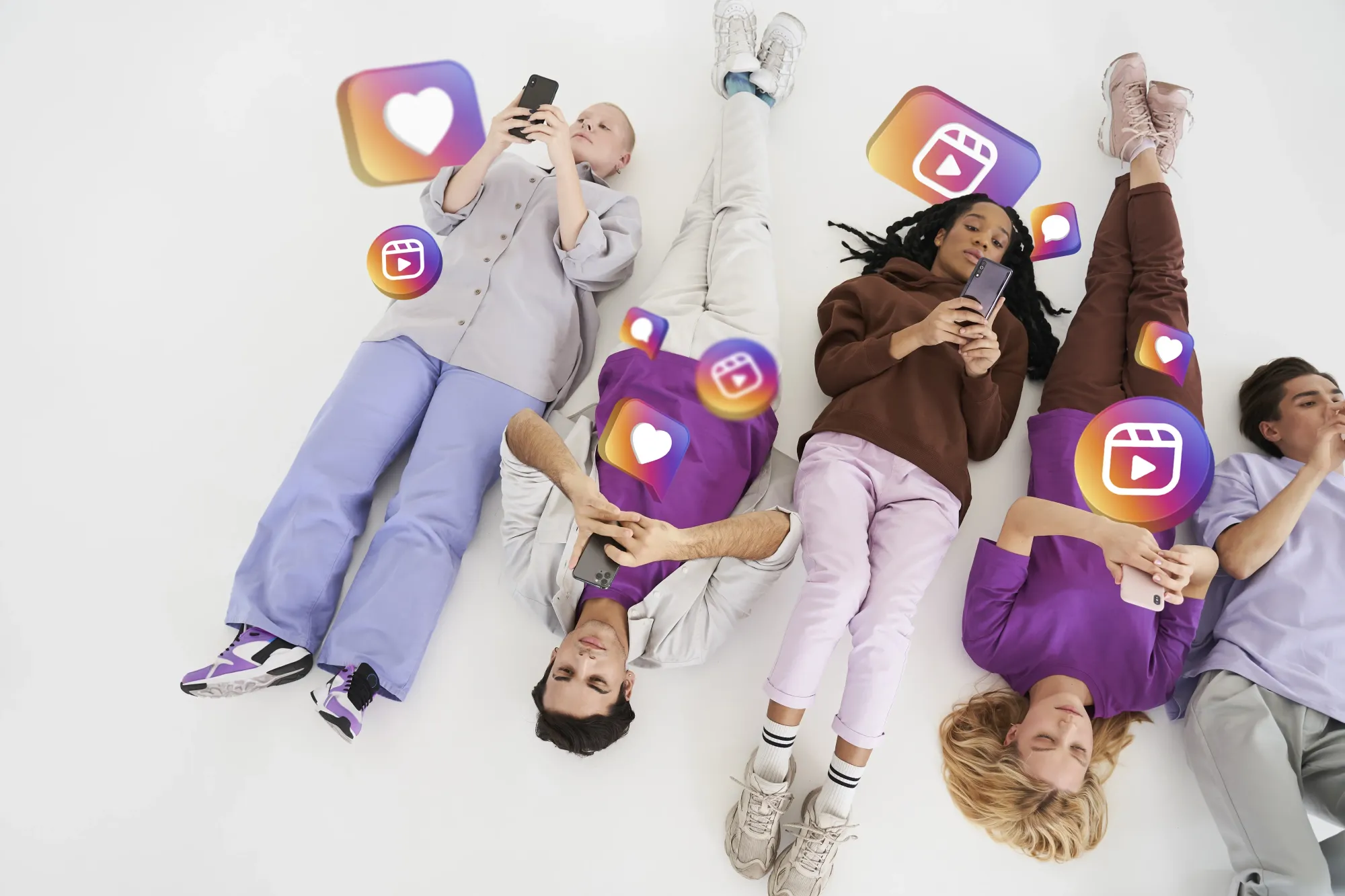Keeping up with influencer marketing trends can feel like chasing a moving target.
Just when you’ve nailed your strategy, new social media trends emerge and shift the game. To stay ahead, it's crucial to understand where influencer marketing is headed next.
Here's what to expect.
Top influencer marketing trends that are taking over
#1 The de-influencing movement gains increased traction
#2 B2B influencer marketing is becoming an important area of the industry
#3 Co-creation represents the next big thing in influencer marketing
#4 Audio channels are getting more attention in influencer marketing
#5 Employees are becoming the new influencers for companies
#6 Virtual influencers are increasingly integrated into brand’s strategies
#7 Micro and nano influencers are on the rise
#8 Long-term partnerships represent the future of influencer marketing
#9 Performance-based influencer marketing matters more than ever
#10 Live shopping and real-time engagement are some of the most effective strategies
#11 Authenticity and transparency are paramount
#12 Budgets for TikTok influencer marketing continue to increase
#13 Diversified video content is the key to success
13 influencer marketing trends to integrate into your strategy
Ready to dive into what's trending in influencer marketing today and shape your strategy for success? Let's get right into it.
#1. The de-influencing movement gains increased traction
How is influencer marketing changing?
The de-influencing movement is gaining significant traction, especially on TikTok, and it’s reshaping the way influencers engage with their followers.
Instead of simply pushing every trending product, influencers are now encouraging a more mindful and thoughtful approach to purchasing.
This trend focuses on challenging over-hyped products that don’t live up to the expectations, urging followers to focus on authenticity, sustainability, and quality over quantity.
The future of social media lies in this shift, influencing how brands approach influencer partnerships, with a stronger emphasis on honesty and meaningful recommendations.
So, how can your brand jump on this trend?
Start by partnering with influencers who align with your values and prioritize transparency. Encourage them to highlight the true value of your products and focus on the quality and sustainability aspects.
Avoid pushing excessive promotions, and instead, let influencers share genuine experiences with your products, focusing on authenticity.
By doing so, you’ll build trust with your audience and stay ahead of the curve as influencer marketing continues to evolve.
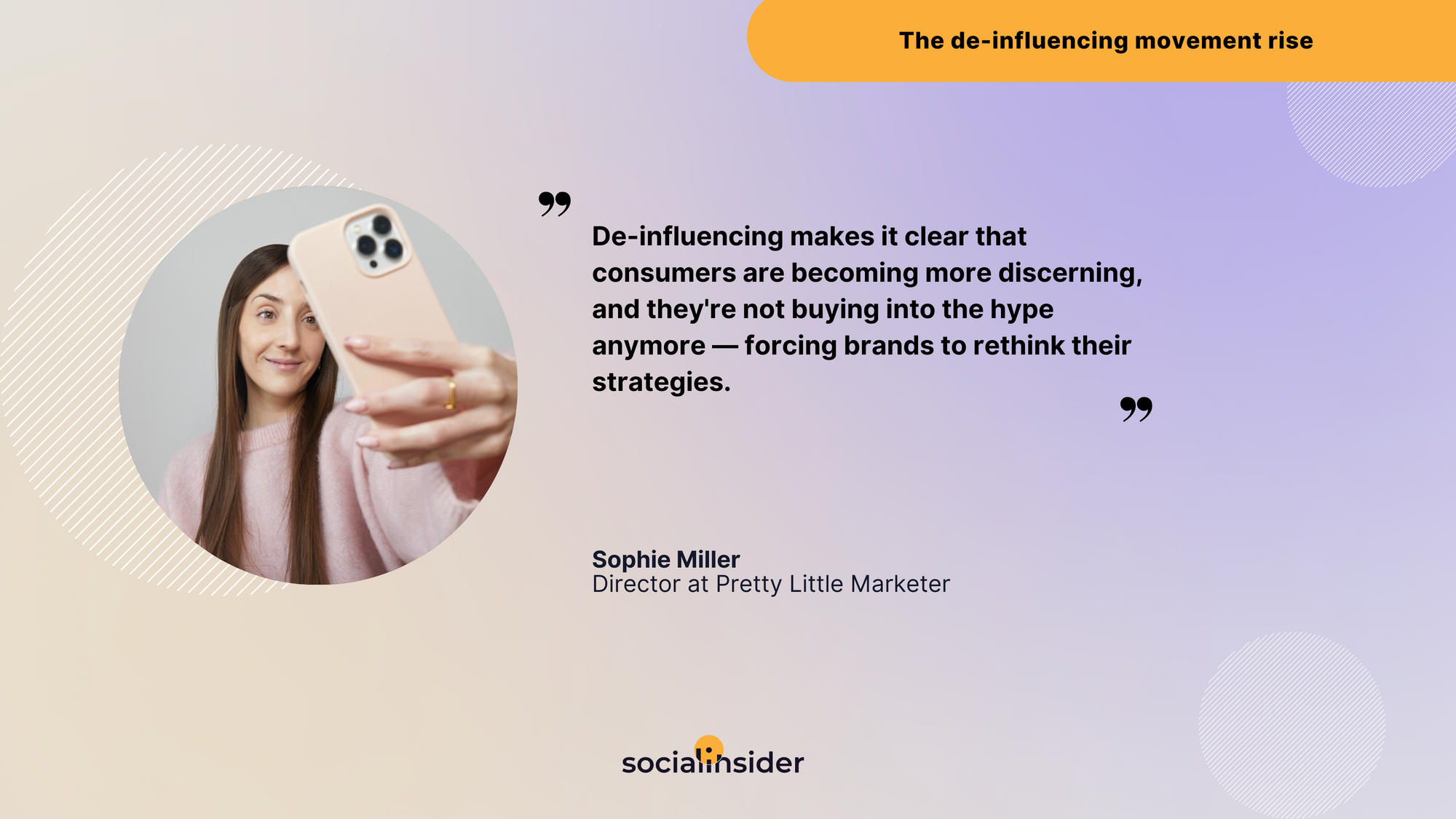
#2. B2B influencer marketing is becoming an important area of the industry
Interestingly, B2B influencer marketing is rapidly becoming an essential part of the influencer marketing landscape.
As businesses increasingly seek to establish credibility and trust with other companies, leveraging influential thought leaders, industry experts, and professionals within niche sectors proves highly effective.
These influencers create highly relevant and informative content that speaks directly to business decision-makers, helping to communicate the value of B2B products or services in a relatable and trusted manner.
Take, for example, Sophie Miller’s Pretty Little Marketer (PLM) teaming up with analytics tool Semrush to provide valuable insights and solutions tailored specifically for social media managers.
By leveraging this partnership, PLM is able to connect with social media professionals who benefit from Semrush’s offerings, driving both engagement and trust within this community.
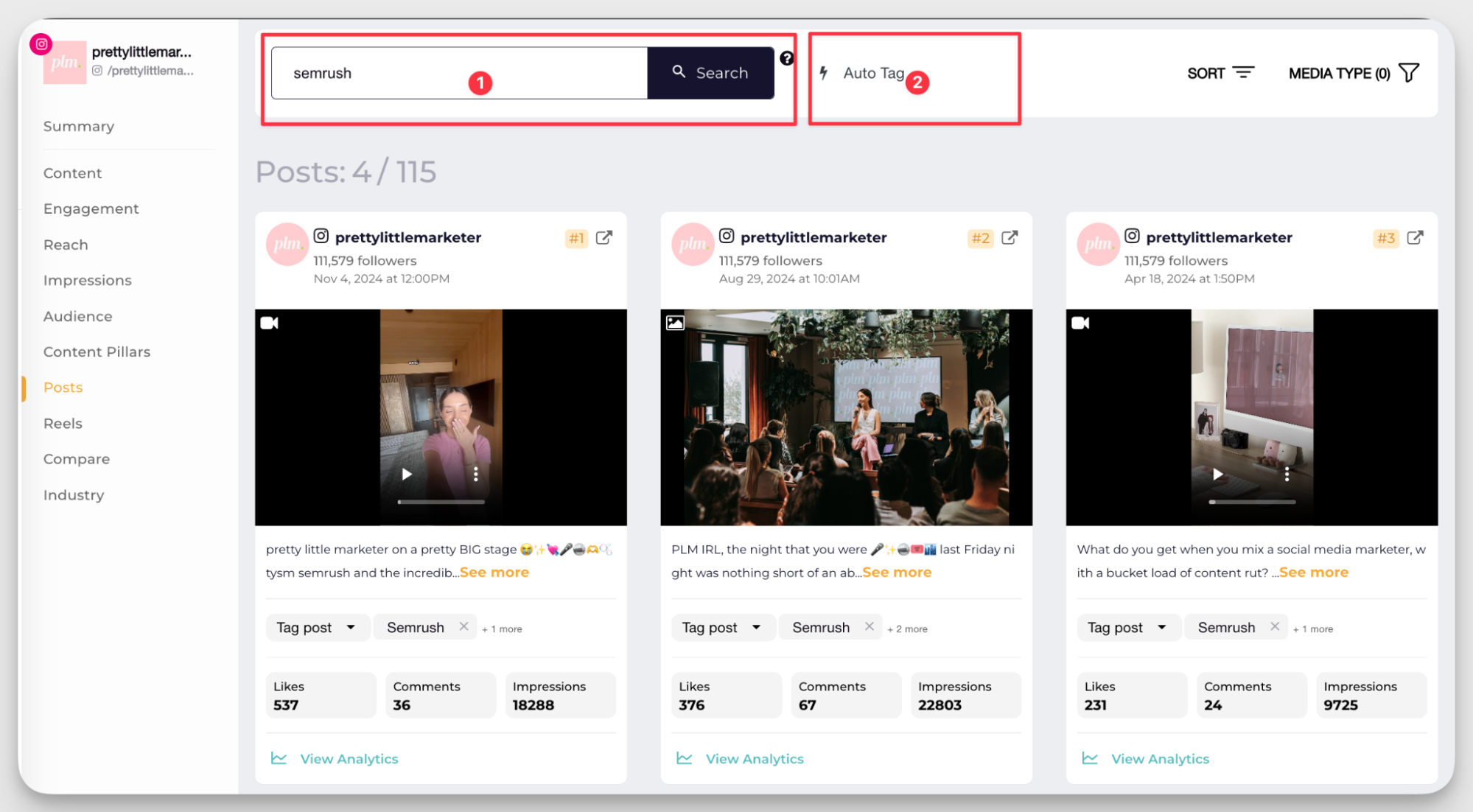
And to effectively evaluate the success of their influencer partnerships, brands can use Socialinsider's content pillars feature, which enables quick content tagging and measuring.
By assigning all the posts related to the collaboration to a content pillar, Semrush can easily track and measure the results generated.
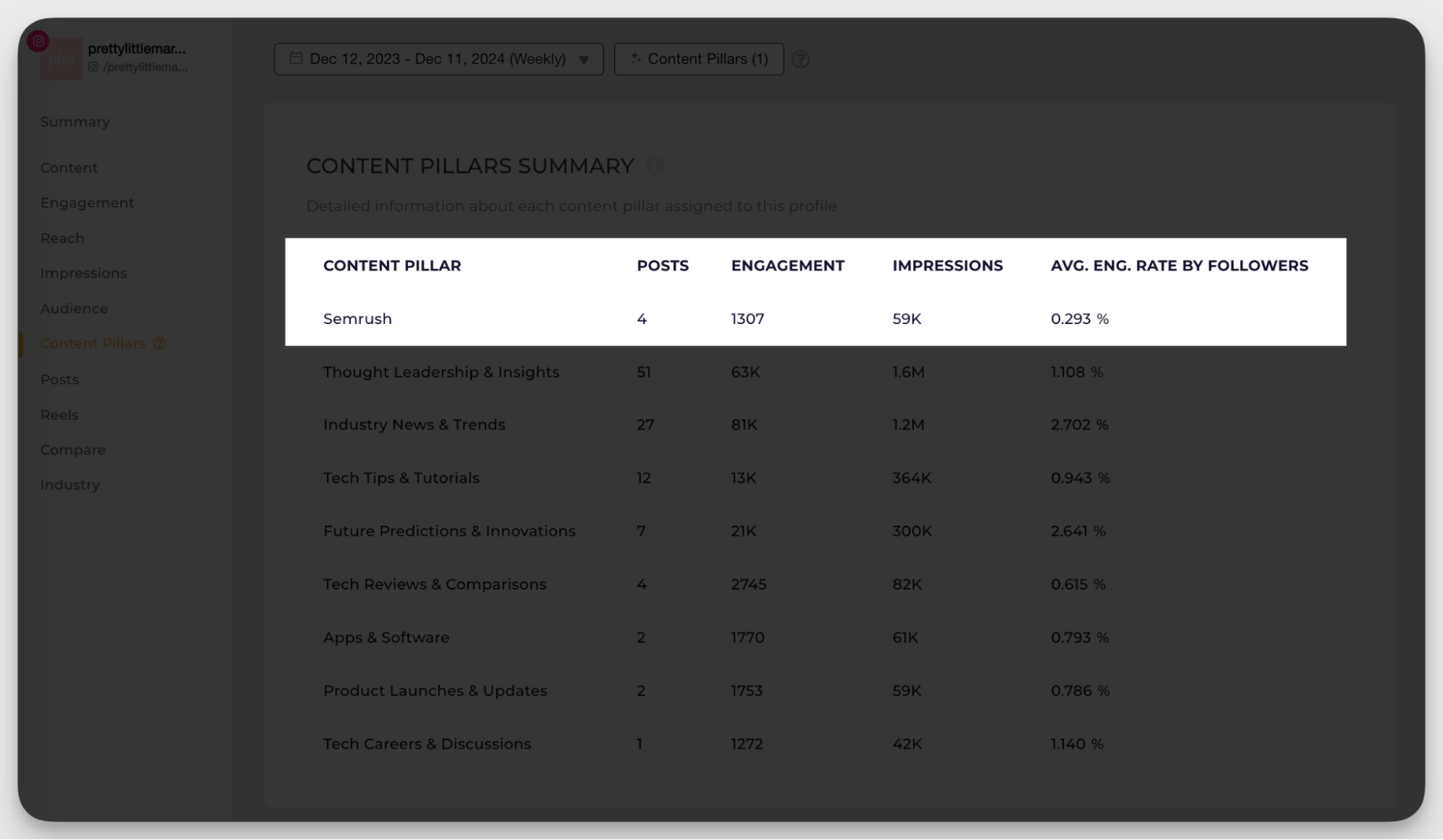
#3. Co-creation represents the next big thing in influencer marketing
One of the new ways of leveraging influencer marketing is through co-creation, where brands collaborate with social media creators in developing products, campaigns, or content.
This approach implies giving influencers a deeper role in the creative process, allowing them to share their insights and ideas, which leads to content that is more authentic and relatable to their followers.
By including influencers early on, brands can craft more personalized, engaging influencer marketing campaigns that resonate with audiences, building trust and driving higher engagement.
Take, for example, Casetify, known for its exciting collaborations with renowned artists.
The brand's latest campaign teases an upcoming collection with Takashi Murakami, a celebrated Japanese artist.
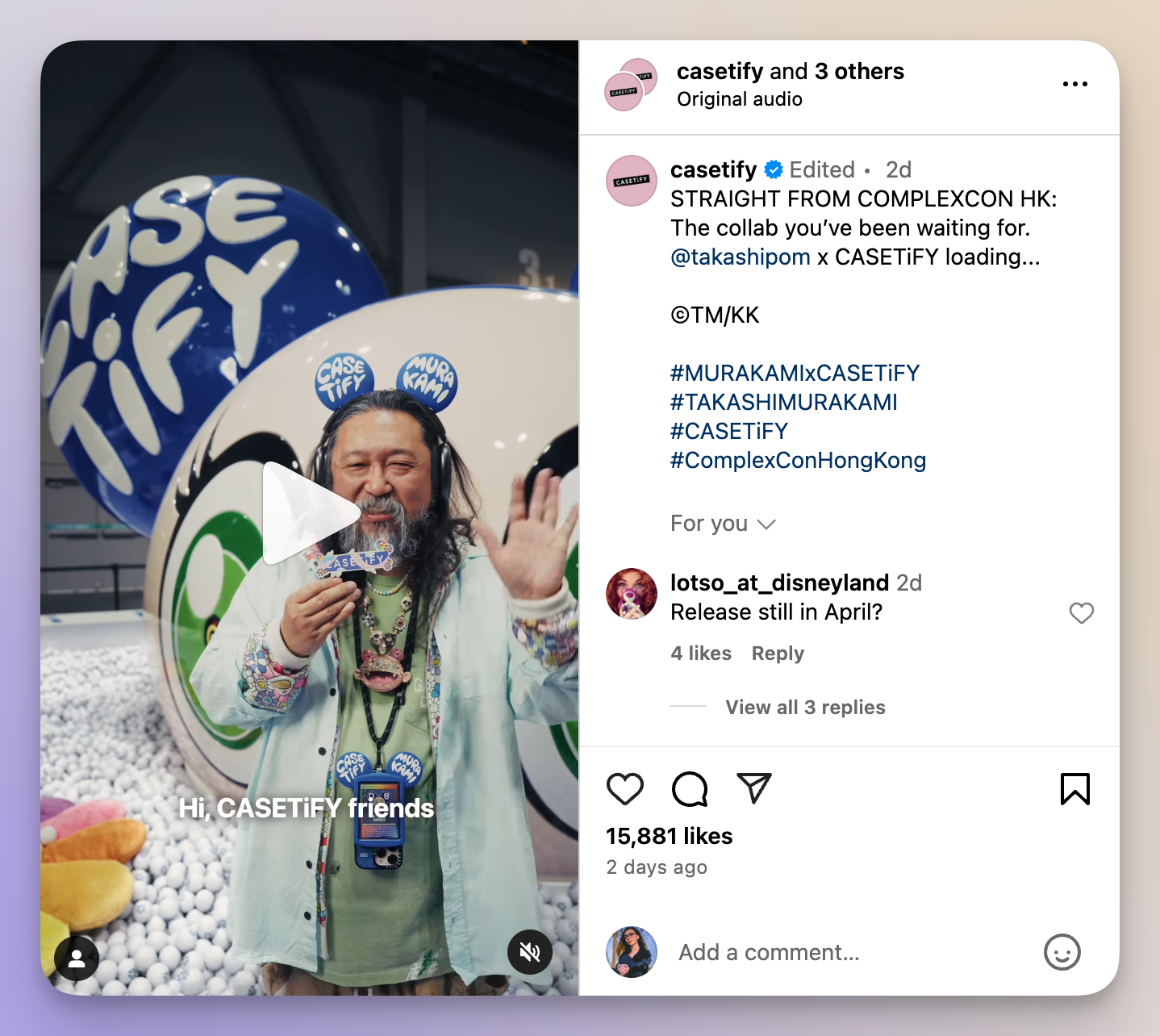
By including Murakami (2.7M Instagram followers) in the creative process, Casetify is able to build anticipation and engagement for the collection.
In the visuals shared, we see Murakami himself promoting the collaboration, highlighting his personal involvement.
This approach not only makes the campaign feel more authentic but also strengthens the connection between the artist, the brand, and the fans, making it a perfect example of how influencer co-creation can drive buzz and increase engagement.
#4. Audio channels are getting more attention in influencer marketing
As we’ve said before, influencer marketing is evolving, and one of the most exciting twists is the surge of audio channels taking over.
With podcasts and audio platforms booming, brands are getting in on the action by teaming up with influencers to create content that feels personal and real.
This is a total game-changer for your social media strategy—we’re talking long-form, deep-dive, conversational content that lets you connect with your audience in a way visuals just can’t match.
It’s all about building trust, telling your brand story in a way that sticks, and giving followers an experience that feels intimate.
Thus, audio content is quickly becoming the new must-have in influencer marketing.
#5. Employees are becoming the new influencers for companies
One of the latest trends in influencer marketing is the rise of employees stepping into the spotlight as the new brand influencers.
This signals major changes in the influencer marketing industry, where companies are tapping into the raw authenticity of their own teams to fuel employee-generated content.
Instead of relying solely on traditional influencers, businesses are turning their employees into powerful brand ambassadors, especially on platforms like LinkedIn, where professional credibility reigns.
It’s a game-changing strategy that lets brands reach a wider audience with content that feels more real, relatable, and trustworthy.
A great recent example of this shift is Lululemon, where employees are stepping into the spotlight as authentic brand influencers.
Take Christopher Page, their EMEA Influencer Marketing Manager, who actively shares behind-the-scenes insights from Lululemon’s creator events, pop-ups, and ambassador partnerships on LinkedIn.
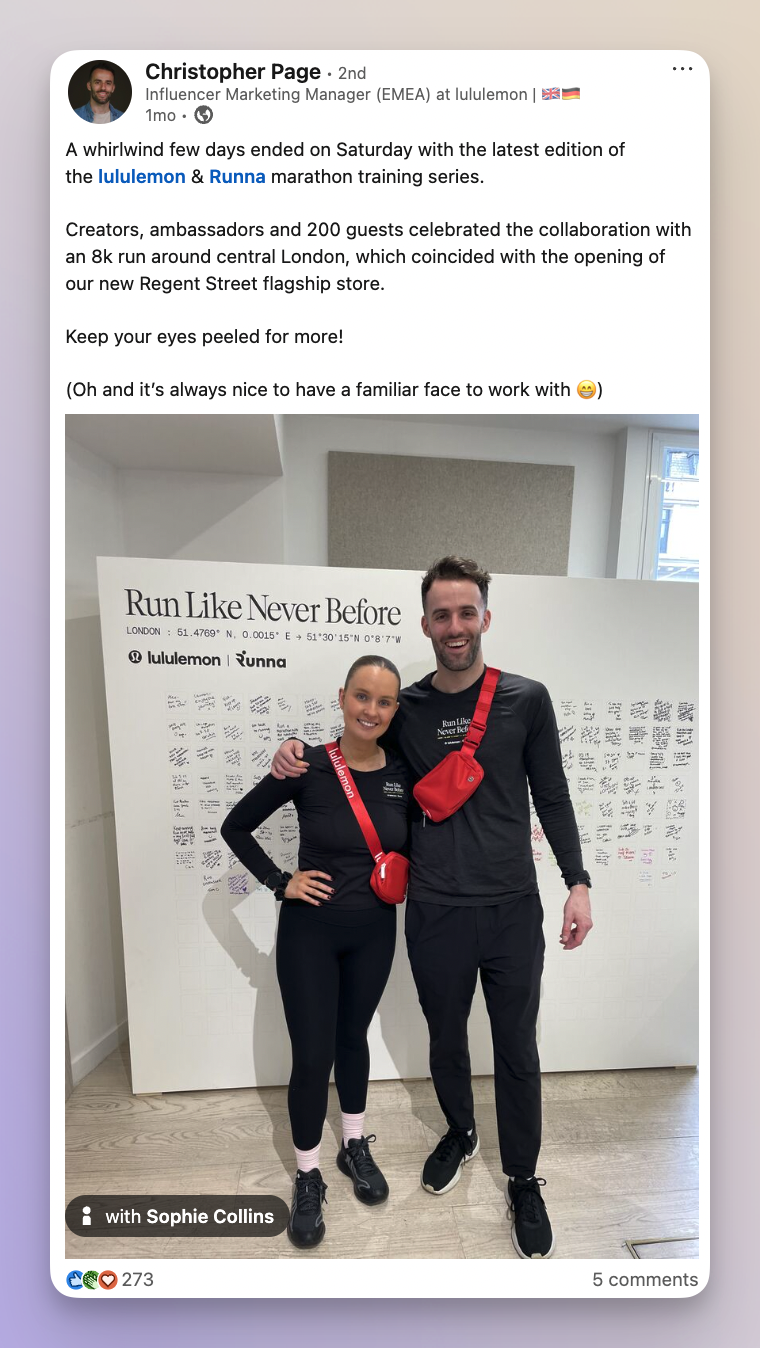
His posts about Berlin and London events — featuring creators, workouts, and collaborations with platforms like LTK and Runna — feel personal, energizing, and real.
These aren’t generic brand updates — they’re first-hand stories from someone inside the brand, giving followers an authentic window into Lululemon’s community and culture.
By empowering employees like Chris to post content that blends work and personality, Lululemon is tapping into a new kind of influence — one that feels way more trustworthy than your typical sponsored post.
#6. Virtual influencers are increasingly integrated into brands’ strategies
In the current influencer marketing scene, virtual influencers—those AI-generated digital personas—are making a serious splash.
These futuristic characters, completely crafted and controlled by brands, bring endless creative possibilities and allow for super-tailored messaging and risk management.
Brands get total control over their public image while still delivering engaging, often out-of-this-world content to their audiences.
Is this a seasonal trend or the future of influencer marketing?
It’s still a bit early to tell, but one thing’s for sure: they’re changing the game in a big way.
A great example supporting the rise of virtual influencers is Lil Miquela, an AI-generated digital persona with 2.4M followers on Instagram.
She recently partnered with Liquid I.V. to promote their hydration products through a series of branded content posts and Reels.
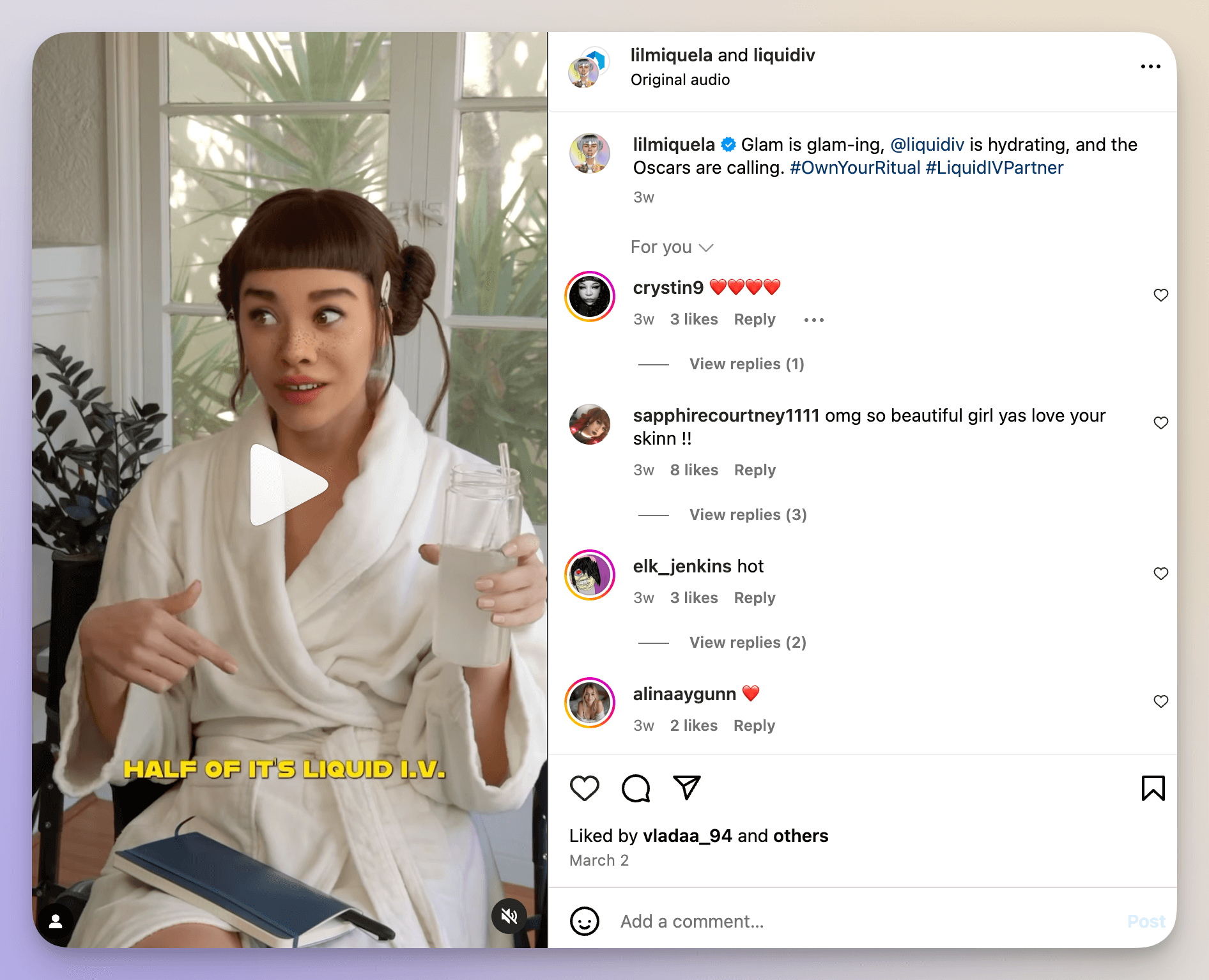
#7. Micro and nano influencers are on the rise
New influencers are taking over the scene, and it’s no surprise that micro and nano influencers are leading the charge, especially in the world of TikTok marketing.
These creators, with their smaller but super-engaged audiences, are becoming a go-to for brands aiming to maximize social media ROI.
Their niche, authentic followings make their recommendations feel more relatable and trustworthy, which often leads to higher engagement rates compared to the big-name influencers.
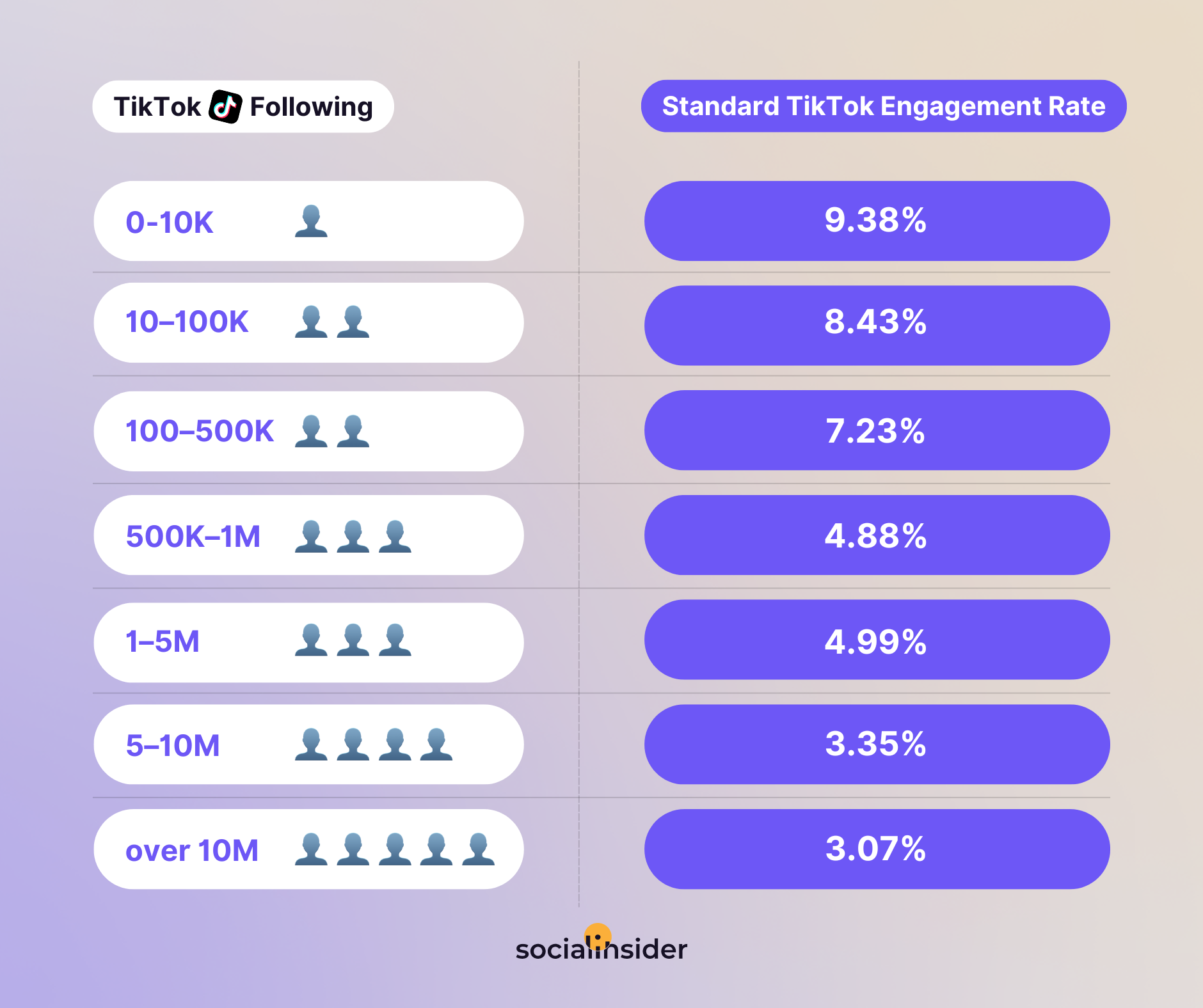
#8. Long-term partnerships represent the future of influencer marketing
One of the best practices for influencer marketing campaigns that’s truly shaping the future is the shift towards long-term partnerships.
Rather than relying on fleeting one-off campaigns, forward-thinking brands are investing in ongoing relationships with influencers, moving away from a transactional approach to one that builds genuine, lasting value.
This shift isn’t just about consistency—it’s about creating an authentic bond that deepens trust, reinforces brand messaging, and keeps the conversation flowing well beyond the campaign.
As influencers become true brand ambassadors, social media campaigns evolve from temporary buzz to sustained, meaningful engagement.
For brands, this approach leads to stronger loyalty, more cohesive messaging, and ultimately, a higher ROI. It’s about transforming short-term hype into long-term impact.
Alo Yoga exemplifies the effectiveness of long-term influencer partnerships.
In October 2024, they appointed BTS's Jin as a global ambassador.
Jin's alignment with Alo Yoga's values of mindfulness and well-being has fostered an authentic connection with his extensive fan base.
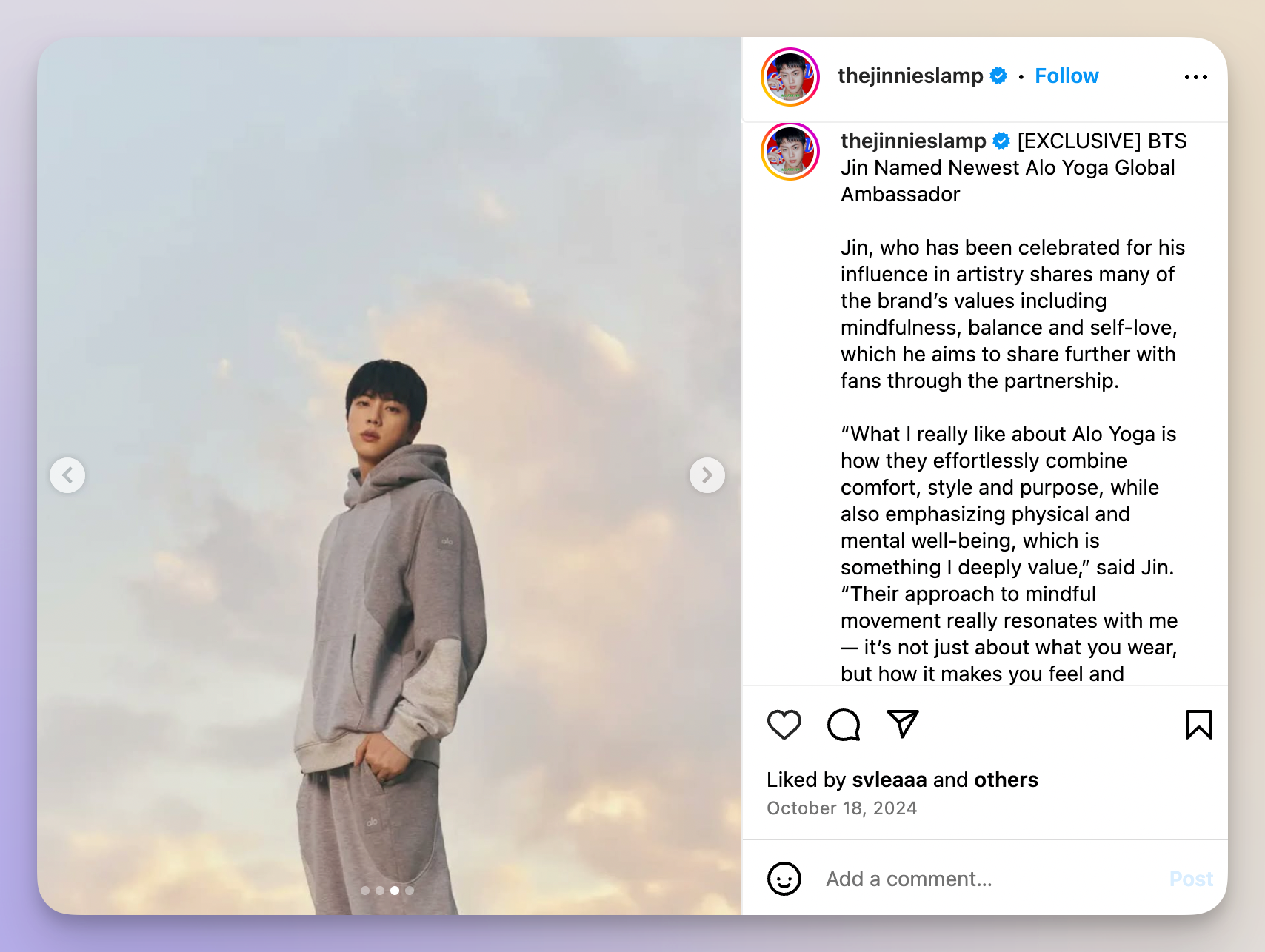
This enduring collaboration not only enhances brand credibility but also drives sustained engagement, illustrating the profound impact of long-term influencer relationships in influencer marketing.
#9. Performance-based influencer marketing matters more than ever
As performance-based influencer marketing becomes the heartbeat of modern campaigns, brands are no longer just chasing likes and shares; they’re increasingly relying on social media insights to track clear, measurable results like conversions, sales, and ROI.
This shift toward performance-driven strategies allows brands to see the real impact of their influencer partnerships, transforming influencer marketing from an art to a science.
By using social media analytics tools, brands can easily analyze individual posts by looking at key metrics like engagement, impressions, reach, and more.
This allows them to directly connect content performance with tangible business results, giving a clear view of how each post drives success.
So if you're looking to analyze your own or your competitors' social media influencer campaigns, here's how to do it with Socialinsider:
- Add your social profile: Start by going to the Socialinsider Home dashboard and adding your brand’s social media profile.
- Assess key metrics: Head over to the Posts section where you can view all the posts from your account. This section will give you detailed metrics for each post.
Start by looking for specific posts by using the search section, which allows you to discover posts based on different queries.
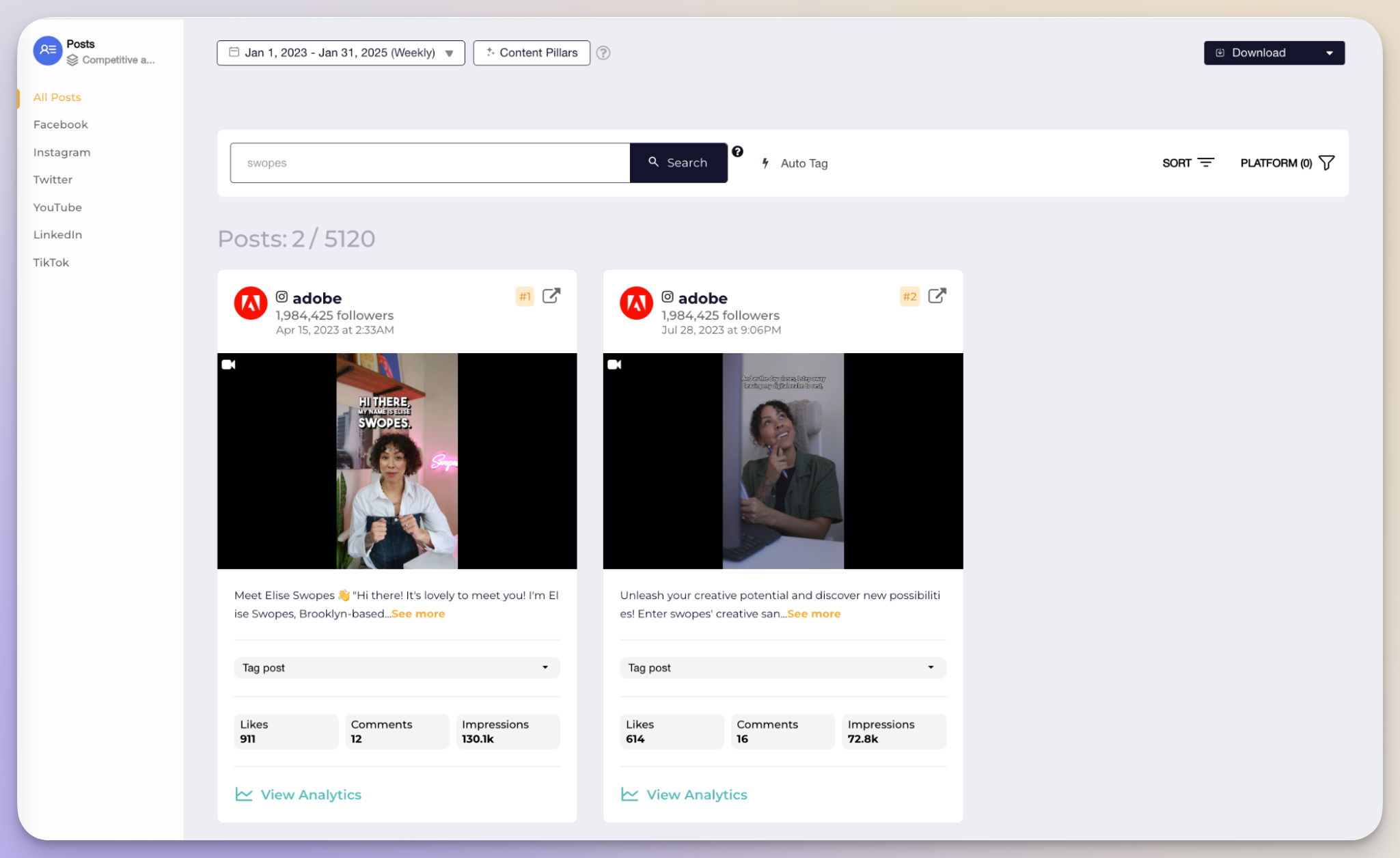
For example, when trying to analyze the KPIs of Adobe's partnership with Elise Swope we discovered the influencer was featured in two of Adobe's Instagram posts - the first one generating more than 130K impressions and the second one more then 72K.
- Identify patterns: After analyzing individual posts, look for trends in content that perform well.
Are certain topics, post formats, or times of day driving higher engagement?
Identifying these patterns helps you refine your content strategy.
- Compare with other influencers: For a broader social media analysis, compare these metrics with other influencers involved in similar campaigns.
This will help you identify trends and determine if the performance is on par with your brand goals.
#10. Live shopping and real-time engagement are some of the most effective strategies
One of the hottest trends in social media influencer marketing right now is live shopping and real-time engagement.
Platforms like Instagram Live, TikTok, and Facebook have transformed influencers into virtual shopping hosts, blending entertainment and commerce seamlessly.
This is all about creating a sense of urgency and excitement, where viewers feel compelled to buy instantly while interacting with the influencer.
Real-time engagement builds trust, making the shopping experience feel more personal and authentic.
As influencers respond to comments, answer questions, and showcase products live, they turn passive viewers into active buyers, driving immediate sales while strengthening the connection between brand and consumer.
Take, for example, Procter & Gamble (P&G) in 2024, where they teamed up with influencers on Douyin (China’s TikTok) to promote Pantene shampoo.
Influencers like Ni Bi Yi and Chou Dan hosted live-streaming sessions, showcasing the products, answering questions, and encouraging immediate purchases.
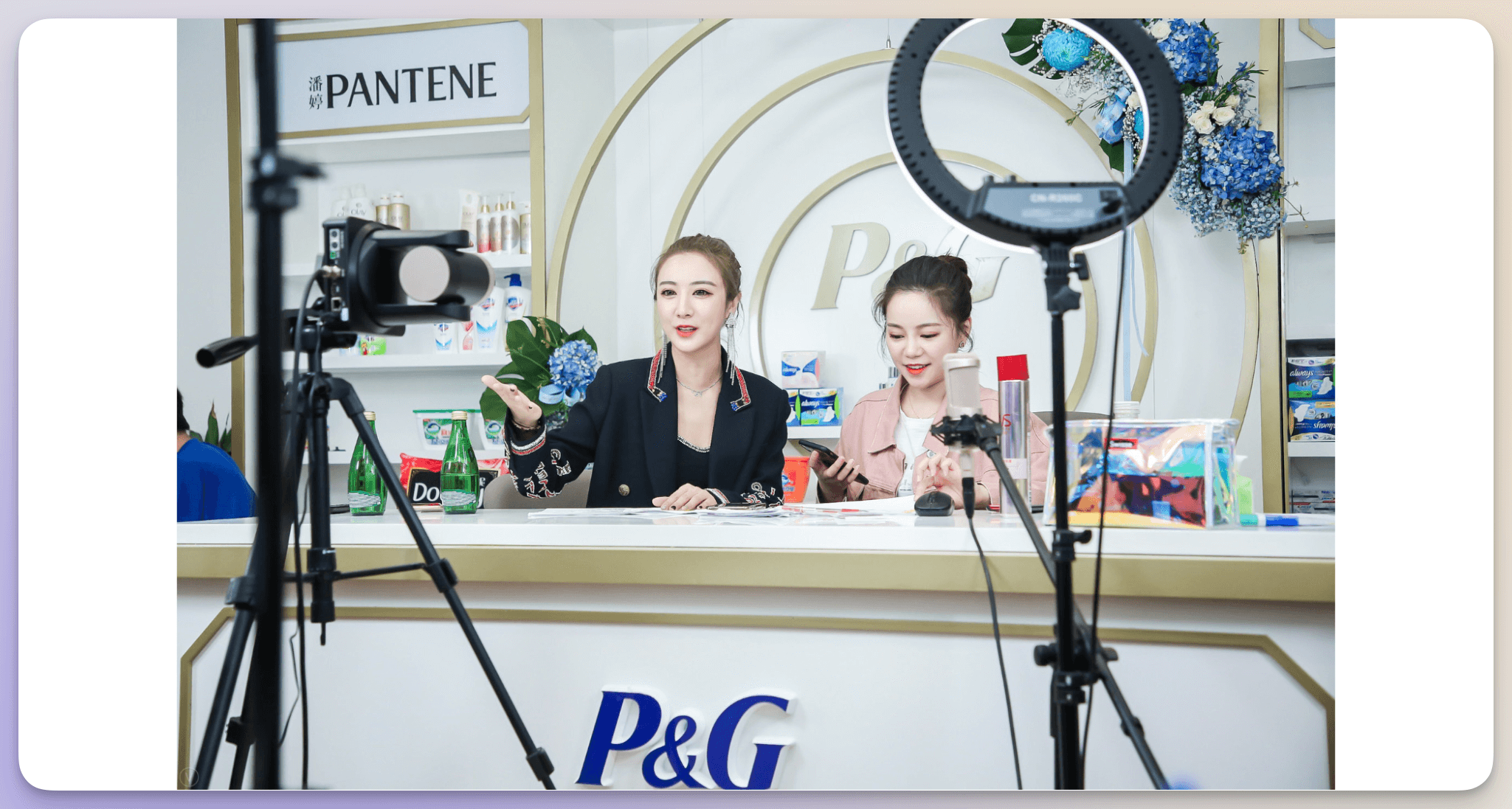
This real-time engagement not only boosted sales but also created a stronger connection with their audience, proving the power of live shopping in driving instant conversions.
#11. Authenticity and transparency are paramount
One of the key trends in influencer marketing that can’t be ignored is the growing demand for authenticity and transparency.
Consumers are no longer passive recipients of content—they are more discerning than ever before.
So, in a social media marketing world flooded with ads and sponsored posts, people crave genuine, honest communication from influencers they follow.
This trend underscores the importance of influencers being upfront about sponsored content and clearly disclosing partnerships.
So, for social media managers and brands, this means prioritizing transparency in all influencer collaborations.
Audiences can easily detect inauthenticity, and when influencers openly present their paid partnerships, they maintain credibility and trust with their followers.
#12. Budgets for TikTok influencer marketing continue to increase
The state of influencer marketing is shifting, and TikTok influencer marketing is leading the way with bigger budgets and more brand investment.
As TikTok continues to dominate the social media landscape, brands are increasingly dedicating larger portions of their marketing dollars to the platform.
With its viral potential, young, engaged audience, and short-form video format, TikTok has become the perfect playground for brand engagement.
It’s no wonder that more brands are jumping on board, fueling a significant rise in spending on influencer partnerships within the TikTok ecosystem.
#13. Diversified video content is the key to success
One of the top 2025 influencer marketing trends shaping the future of brand engagement is the diversification of video content.
As attention spans shrink and social media content consumption habits evolve, brands are no longer sticking to a one-size-fits-all video strategy.
Instead, they’re embracing a mix of short-form, long-form, live-streamed, and interactive video formats to meet their audiences where they are—and how they prefer to engage.
From TikTok’s bite-sized creativity to YouTube’s in-depth storytelling and Instagram’s live Q&As, every platform demands a different kind of content.
Short-form videos are perfect for quick dopamine hits and trend hijacking, while long-form formats build trust, authority, and deeper connection. Live streams and interactive videos, on the other hand, add a layer of authenticity and real-time engagement that traditional formats can’t replicate.
This shift reflects a broader consumer demand: social media content that’s immersive, versatile, and built to spark interaction.
Brands that adapt to this multi-format video approach are not just increasing reach—they're building stronger communities and driving higher conversions.
2025 is the year of full-spectrum video strategy. Naturally, influencer campaigns that lean into this flexibility will stand out in an oversaturated scroll-feed.
Final thoughts
The influencer game is flipping the script—if you're not keeping up, you’re behind.
Forget the fluff—it’s all about raw, real connections, co-creation, and authenticity.
From micro-influencers to employees as brand ambassadors, influencer marketing is getting personal, powerful, and exciting.
Ready to lead the charge?
FAQs about influencer marketing trends
What are the challenges of maintaining authenticity while scaling influencer marketing efforts?
As influencer marketing scales, maintaining authenticity can become challenging due to the increased volume and frequency of partnerships. Brands must carefully select influencers whose values align with theirs and manage campaigns to preserve the personal touch that resonates with audiences.
How do brands deal with the fluctuating popularity of influencers?
Brands often mitigate risks associated with the fluctuating popularity of influencers by diversifying their influencer portfolios, engaging with a mix of established and emerging influencers across various platforms to maintain a steady presence and audience reach.
